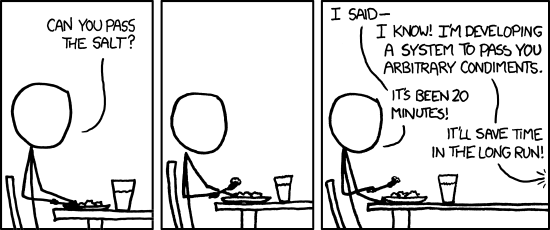Systems, Spirit, Process & Perfection
“Nature abhors a paradox,†they say.
I abhor a bad system. Or worse, a lack of system. But as a designer who frequently (or at least hopefully) veers into the artful, I’m working in the midst of a paradox. My desires and my roles produce—and sustain—inconsistencies. Artists and systems go to war with one another. I’m my own worst enemy, unable to escape self-inflicted tension.
I don’t like to design things in a vacuum; I believe everything affects everything. So I’m not designing one sign, I’m designing all of the signs, or it’s not a brand package. I’m not fixing the space between that 1 and 3, I’m fixing all the kerning pairs, or it’s not a usable typeface. Nothing stands on its own. No task is an island. There is always groundwork to lay before the journey can begin, because without a system, chaos and dissonance will form and inform the culture. Maybe you can relate. Or maybe you know a guy…
Processes are important, but processes without spirit are fundamentally useless.
There is a way in which we systems-minded folk systematically become no fun to work with. We’re so rigid, so dedicated, so passionate to erase outliers and metaphorical (or literal) squiggly lines, we let the system itself become our purpose, not the purpose we began building the system for.
In ancient Rome, the civic magistrate’s authority was visually represented by the Fasces1, a bundle of wooden rods tied around an axe, symbolizing “strength through unity.†A single rod is easily broken, but the bundle is difficult to overcome. The Fasces were carried by the magistrate’s bodyguards, and often used for dealing out punishment on command.
The Fasces are where we get the word “fascism.†Fascism is tricky to pin down and define, but it is foremost an authoritarian form of government. An indoctrination. An unforgiving discipline. And systems-minded people tend toward fascism in their respective mediums whenever we make the system more important than the mission.
I’m a systems fascist, and that’s not always a good thing.
I sometimes choose process over people. But normal people don’t notice design-centric subtleties like bad kerning or mismatched corner radiuses or off-brand fonts. They just live and move and have their interactions with what we help make. They want things that work. That make life more enjoyable. Or easier.
And they’re waiting on us, the makers of things, to make things. Not to talk about making things. Not to plan about making things. Not to create the perfect little world where our creations can exist, untarnished and under control. But to release them into a messy, complicated, rule-breaking world for people to use, and abuse. Henry Ford said, “You can’t build a reputation on what you’re going to do.†So it is with us.
The world is waiting. We are planning. And planning isn’t bad, so long as it doesn’t get in the way of actually doing…

Perfect systems are pretty graveyards if we let our perfectionist tendencies rule with an authoritarian fist. Goethe rightly believed “[The] things which matter most must never be at the mercy of things which matter least.†If the system doesn’t serve the project, why bother? If it causes more work now than it will ever save you then, it’s a waste of time.
Your system, however perfect, isn’t precious—your time is. Your system is just a tool. But the tool isn’t the thing you’re building. The map is not the territory. If it doesn’t help accomplish the mission, it’s a distraction from the mission. And all your work to bring efficiency to a process is spent on the wrong stuff, at the expense of the right stuff.
Perfection ruins things. Perfection will stop you from starting projects. Perfection will stop you from finishing projects. Perfection is not interesting.
Be a human. Risk. Make some art. Open yourself up to the possibility of being surprised and delighted. Because you know what’s worse than a lack of good systems? A lack of finished projects. Or finished projects that no one cares about.
Soulless systems will strangle you, the people around you, and the people you want to reach. So have some spirit. Or don’t bother building a system at all.
Since the fall of the Roman Empire, the Fasces have come to symbolize power and authority in a more general cultural sense. Mussolini, Napoleon, the Nazis, Harvard, countries, currencies, fraternities—they’ve all co-opted the symbol on uniforms, hiding them in insignia, and decorating architecture. In fact, the next time you’re in Washington D.C., be sure to note the arms of the chair where Lincoln makes his home.